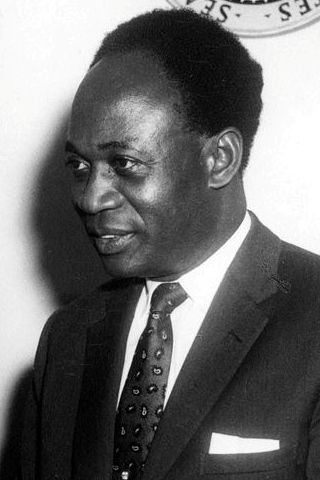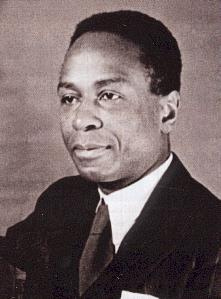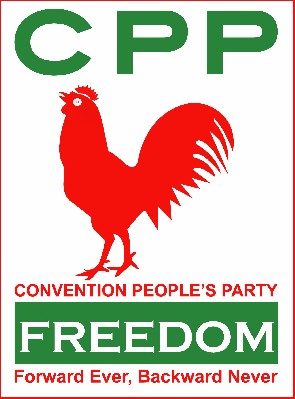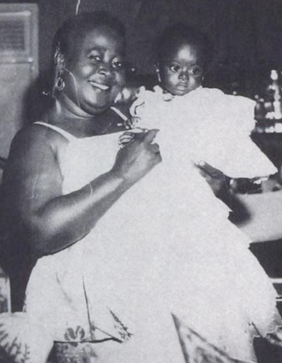Related Research Articles

Kwame Nkrumah was a Ghanaian politician, political theorist, and revolutionary. He was the first Prime Minister and President of Ghana, having led the Gold Coast to independence from Britain in 1957. An influential advocate of Pan-Africanism, Nkrumah was a founding member of the Organization of African Unity and winner of the Lenin Peace Prize from the Soviet Union in 1962.

The Republic of Ghana is named after the medieval West African Ghana Empire. The empire became known in Europe and Arabia as the Ghana Empire after the title of its Emperor, the Ghana. The Empire appears to have broken up following the 1076 conquest by the Almoravid General Abu-Bakr Ibn-Umar. A reduced kingdom continued to exist after Almoravid rule end, and the kingdom was later incorporated into subsequent Sahelian empires, such as the Mali Empire several centuries later. Geographically, the ancient Ghana Empire was approximately 500 miles (800 km) north and west of the modern state of Ghana, and controlled territories in the area of the Sénégal River and east towards the Niger rivers, in modern Senegal, Mauritania and Mali.

Kwame Ture was a prominent organizer in the civil rights movement in the United States and the global pan-African movement. Born in Trinidad, he grew up in the United States from the age of 11 and became an activist while attending the Bronx High School of Science. He was a key leader in the development of the Black Power movement, first while leading the Student Nonviolent Coordinating Committee (SNCC), then as the "Honorary Prime Minister" of the Black Panther Party (BPP), and last as a leader of the All-African People's Revolutionary Party (A-APRP).

The national flag of Ghana consists of a horizontal triband of Red, Gold, and Green. It was designed in replacement of the British Gold Coast's Blue Ensign.
The Pan-African Congress was a series of eight meetings, held in 1919 in Paris, 1921 in London, Brussels and Paris, 1923 in London, 1927 in New York City, 1945 in Manchester, 1974 in Dar es Salaam, 1994 in Kampala, and 2014 in Johannesburg that were intended to address the issues facing Africa as a result of European colonization of most of the continent.

Pan-Africanism is a worldwide movement that aims to encourage and strengthen bonds of solidarity between all Indigenous and diaspora peoples of African ancestry. Based on a common goal dating back to the Atlantic slave trade, the movement extends beyond continental Africans with a substantial support base among the African diaspora in the Americas and Europe.

George Padmore, born Malcolm Ivan Meredith Nurse, was a leading Pan-Africanist, journalist, and author. He left his native Trinidad in 1924 to study medicine in the United States, where he also joined the Communist Party.

The Convention People's Party (CPP) is a socialist political party in Ghana based on the ideas of the first President of Ghana, Kwame Nkrumah. The CPP was formed in June 1949 after Nkrumah broke away from the United Gold Coast Convention (UGCC). Nkrumah was the then appointed Secretaty General of the UGCC when he was arrested by the leader of the UGCC and imprisoned for an alleged thought, plans and power against Kwame Nkrumah's leadership. Kwame Nkrumah then formed the Convention People's Party with support of some UGCC members and had a purpose for self governance. Upon Kwame Nkrumah's leadership with the CPP, he orgranized a non violent protest and strike for support of the purpose for self-governance which took him to imprisonment for a second time, but he was released after winning a massive vote by the CPP following the colonies election general election whilst he was in prison. The CPP followers supported Nkrumah's ideas and voted for him massive for power of self-governance. The articles discussed about the origins of Ghana political parties, the 1948 riot and the birth of the Convention People Party among others. Issues that led to the formation of the CPP, struggles with the colonial powers led by Kwame Nkrumah and finally the attainment of Ghana's independence were part of the key concerns for this write up.

Anna Pauline "Pauli" Murray was an American civil rights activist who became a lawyer, gender equality advocate, Episcopal priest, and author. Drawn to the ministry, in 1977 she became one of the first women—and the first African-American woman—to be ordained as an Episcopal priest.

The Union of African States, sometimes called the Ghana–Guinea–Mali Union, was a short-lived and loose regional organization formed in 1958 linking the West African nations of Ghana and Guinea as the Union of Independent African States. Mali joined in 1961. It disbanded in 1963.

Anna Arnold Hedgeman was an African-American civil rights leader, politician, educator, and writer. Under President Harry Truman, Hedgeman served as executive director of the National Council for a Permanent Fair Employment Practices Commission, having worked on his presidential campaign. She was also appointed to the cabinet of New York City mayor Robert F. Wagner, Jr., becoming the first African-American woman to hold a cabinet post in New York. Hedgeman was a major advocate for both minorities and the poor in New York City. She also served as a consultant for many companies and entities on racial issues, and late in her life founded Hedgeman Consultant Services. She was among the organizers of the 1963 March on Washington. Throughout her many years involved in the civil rights movement, she befriended Dorothy Height.

Samia Yaba Christina Nkrumah is a Ghanaian politician and chairperson of the Convention People's Party (CPP). In the 2008 parliamentary election, she won the Jomoro constituency seat at her first attempt. She is the daughter of Kwame Nkrumah, first President of Ghana.

Nkrumaism is an African socialist political ideology based on the thinking and writing of Kwame Nkrumah. Nkrumah, a pan-Africanist and socialist, served as Prime Minister of the Gold Coast from 1952 until 1960 and subsequently as President of Ghana before being deposed by the National Liberation Council in 1966.

The history of African Americans in Ghana goes back to individuals such as American civil rights activist and writer W. E. B. Du Bois, who settled in Ghana in the last years of his life and is buried in the capital, Accra. Since then, other African Americans who are descended from slaves imported from areas within the present-day jurisdiction of Ghana and neighboring states have applied for permanent resident status in Ghana. As of 2015, the number of African-American residents has been estimated at around 3,000 people, a large portion of whom live in Accra.

Hannah Esi Badu Kudjoe, née Hannah Dadson, was a prominent activist for Ghanaian independence in the 1940s and 1950s. She was one of the first high-profile female nationalists in the movement, and was the National Propaganda Secretary for the Convention People's Party. She was a political activist during the government of Dr. Kwame Nkrumah. She was also an active philanthropist and worked to improve women's lives in Northern Ghana. Hannah had the ability to bring people together. She was able to convince others to support and fight for independence. She helped Kwame Nkrumah in bringing people to join the CPP and support it. She once helped the Big Six when they were arrested by bringing people together to call for their release by the colonial masters.

Victoria Garvin was an American political activist, Pan-Africanist, and self-described "working class internationalist." While growing up in a working-class family during the height of the Great Depression, Garvin was exposed early on to the realities of both proletariat and racial exploitation. Garvin became a prominent organizer in the Black Left during the height of McCarthyism, before traveling to Nigeria, Ghana, and China. In Ghana, Garvin was a member of a committee who received Malcolm X and created his itinerary, since Garvin had previously met him in Harlem. As a lifelong activist and radical intellectual, Garvin created direct links between Black Power politics, Pan-Africanism, and Third World liberation.

Maida Springer Kemp was an American labor organizer who worked extensively in the garment industry to improve labor standards for men and women in America through the Local Union 22. She was also known for her extensive work in Africa for the AFL–CIO. Nicknamed "Mama Maida", she advised fledgling labor unions, set up education and training programs, and liaised between American and African labor leaders. In 1945, traveling to England on a labor-exchange trip, as well as observing the conditions of war-torn Britain she would become one of the first African-American woman to represent US labor abroad. She was also active in the civil rights movement, and advocated for women's rights around the world. She was very active in these movements for most of her life.
The National Federation of Gold Coast Women (NFGCW), later renamed the Ghana Federation of Women, was a women's organization in the Gold Coast, one of the country's first women's organizations. Established by Evelyn Amarteifio in 1953, it was dissolved in 1960 as Kwame Nkrumah pursued government control of women's organizations in Ghana.
The National Council of Ghana Women (NCGW) was a Ghanaian women's organization announced by Kwame Nkrumah in 1960. It was disbanded on Nkrumah's fall in 1966.
Ama Biney is a British Ghanaian historian, journalist, political scientist and academic, who for more than 25 years has lectured and taught courses on African and Caribbean history, the History of Black People in Britain, and on international relations in the UK and in Ghana, including at such institutions as Middlesex University, Birkbeck College, University of London, the University of Liverpool, and Webster University Ghana. Among outlets for which she has written are New African magazine, African Studies Quarterly, South African History Online and Pambazuka News, for which she has served as Editor-in-Chief. As an independent Pan-Africanist scholar and activist, she follows Steve Biko's tradition of "writing what she likes."
References
- ↑ Abayomi Azikiwe (8 September 2016). "Pan-Africanism, women's emancipation and the meaning of socialist development". Pambazuka News. Retrieved 20 January 2021.
- ↑ Kiazolu, Yatta Winnie (2020). "All The Women Are Meeting": The National Council of Negro Women, Emerging Africa, and Transnational Solidarity, 1935-1966 (PhD). University of California Los Angeles.
- 1 2 3 Rosalind Rosenberg (2017). Jane Crow: The Life of Pauli Murray. Oxford University Press. pp. 260–263. ISBN 978-0-19-065647-8.
- 1 2 Kevin E. Grimm (2012). Symbol of Modernity: Ghana, African Americans, and the Eisenhower Administration (Thesis). Ohio University. pp. 311–.
- 1 2 Kathleen Sheldon (2016). "Cudjoe, Hannah". Historical Dictionary of Women in Sub-Saharan Africa. Rowman & Littlefield. p. 67. ISBN 978-1-4422-6293-5.